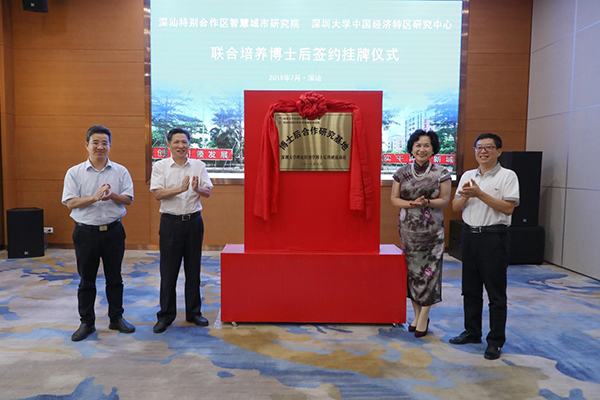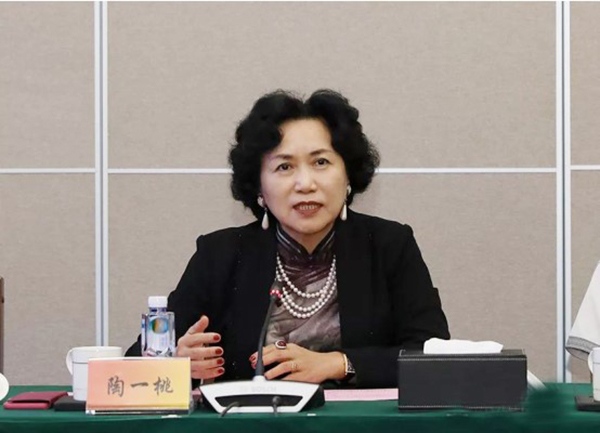On the afternoon of July 15, 2019, China Center for Special Economic Zone Research (CCSEZR) of Shenzhen University (SZU) and Shen Shan Smart City Research Institute Co., Ltd. held an inauguration ceremony for the SZU-ShenShan SCZ postdoctoral cooperative research base under the Postdoctoral Station of Theoretical Economics of SZU. The two sides signed a strategic framework agreement on cooperation in training postdoctoral fellows. This move will usher in a new cooperation model where the two sides will partner with each other in both recruiting and training postdoctoral fellows, and will have a profound positive impact on the construction and development of Shenzhen-Shanwei Special Cooperation Zone (ShenShan SCZ), the “10+1” district of Shenzhen city. This memorable inauguration ceremony was held in the presence of Prof. Tao Yitao, director of CCSEZR, president of the Belt and Road Research Institute (Shenzhen) for International Cooperation and Development (BRRIICD) and president of the Belt and Road Research Institute of SZU, Prof. Gao Xingmin, deputy director of CCSEZR, Mr. Chan Yaodong, secretary of the Party Working Committee of ShenShan SCZ, and Mr. Huang Weiping, deputy secretary of the Party Working Committee and director of the Administrative Committee of ShenShan SCZ.

Prof Tao Yitao and Secretary Chan Yaodong inaugurate the Postdoctoral Station of Theoretical Economics of SZU

Ceremony for signing the strategic framework agreement on cooperation in training postdoctoral fellows
The Postdoctoral Station of Theoretical Economics of SZU (hereinafter referred to as the Station) was founded with the approval of the Ministry of Human Resources and Social Security of the PRC in October, 2012, as the sole postdoctoral research station of humanities and social sciences in SZU and Shenzhen city. Since its foundation, the Station has recruited 150 postdoctoral fellows with about 100 still working there, undertaken a total of 60 government-sponsored research projects, with over 40 projects funded by China Postdoctoral Science Foundation, and published nearly 300 academic papers in authoritative journals inside and outside China. Fifteen departments and research institutes of SZU rely on the Station to recruit postdoctoral fellows, covering economics, management, law, politics, sociology, psychology, art, communication, etc. To implement the Measures for Promoting Talent Development and give full play to its strength in theoretical research and local experience, the Station vigorously collaborate with all appropriate organizations like Shenzhen Postdoctoral Innovation Practice Base in training postdoctoral fellows. It has recruited 20 postdoctoral fellows for 13 postdoctoral innovation practice or cooperation bases including Shenzhen Fair Trade Promotion Agency, Shenzhen HTI Group Co., Ltd., Shenzhen Qianhai Institute for Innovative Research (QIIR), Harbin Development and Reform Commission, the Horgos Government, Kashi University, etc. Meanwhile, to serve the Belt and Road Initiative (BRI), the Station has established overseas postdoctoral training and research bases with Kazakhstan Sakarin University, Saysettha Development Zone of Lao and Malaysia’s Forest City in Malacca.
According to the cooperative agreement between SZU and ShenShan SCZ, both sides will leverage their resources in long-term cooperation to design and improve the methods for training postdoctoral fellows in industrial economy, regional economy, urban development and smart city. CCSEZR will be one of the key partner institutes of Shen Shan Smart City Research Institute Co., Ltd., and the latter will be a key partner organization (substation) for practice and internship of postdoctoral fellows of the former.

Prof. Tao Yitao delivers a speech.
Prof. Tao Yitao stated that CCSEZR is the sole research base for SEZ issues under the Ministry of Education in China. Shenzhen is playing an increasingly important role in the Guangdong-Hong Kong-Macao Greater Bay Area, so is ShenShan SCZ as the “10+1” district of Shenzhen city. This cooperation is beneficial to both the academic research of SZU and the local economy of ShenShan SCZ. Think tanks are of great significance primarily because they can help reduce the cost of development by offering feasible suggestions based on rational analysis of social development. This cooperation can help SZU accumulate more practical experience and allow ShenShan SCZ to acquire more theoretical knowledge. She hoped that the SZU-ShenShan SCZ Postdoctoral Cooperative Research Base backed by university-business-government collaboration would contribute to strategy-making about the development of the Greater Bay Area at the state level, and become a both theoretically and practically significant think-tank that could offer constructive ideas for China’s development.

Secretary Chan Yaodong delivers a speech.
Secretary Chan Yaodong said that ShenShan SCZ was a major strategic deployment made by Guangdong provincial Party committee and government to implement Xi Jinping Thought on Socialism with Chinese Characteristics for a New Era and to promote coordinated development of regions and regional cooperation model innovation. CCSEZR has reached an agreement with Shen Shan Smart City Research Institute Co., Ltd. to set up a postdoctoral cooperative research base which is expected to be a prominent intellectual support for building ShenShan SCZ into the eastern gateway of the Greater Bay Area, a new center of the eastern Guangdong coastal economic belt, a self-independent innovation zone of Shenzhen, and a new modern, international coastal smart city. Given the significance of the postdoctoral cooperative research base, Secretary Chan Yaodong set great hope on the base. He suggested that the base vigorously recruit outstanding postdoctoral fellows to expand ShenShan SCZ’s connections with other scientific research networks and make itself a center of innovation and scientific achievement transformation that was teeming with talented postdoctoral fellows as soon as possible. Moreover, the base should function as a high-level think tank that could provide cutting-edge solutions concerning enclave, industrial, regional and urban economies and smart city for ShenShan SCZ to help it overcome institutional problems and become a pioneer in enclave economy, enclave governance and urbanization of enclave villages. He also hoped that CCSEZR could continue to give great support to ShenShan SCZ, and offer constructive advice for postdoctoral recruitment and training, so as to help ShenShan SCZ build a high-end postdoctoral training platform as soon as possible.
Prof. Gao Xingmin said that the base was a platform for both sides to conduct cooperation, and the signing of the strategic cooperative agreement put the platform into formal use. It plays an incomparable role in attracting high-end talent for ShenShan SCZ and in joint study on enclave type SEZs and therefore has unique values. Prof. Gao suggested that Shen Shan Smart City Research Institute Co., Ltd.: (1) actively apply to establish an innovative practice base to allow postdoctoral fellows to better serve ShenShan SCZ; (2) designate persons to supervise and train postdoctoral fellows, and intensify their efforts in recruiting postdoctoral fellows during graduation season; and (3) extend the cooperation scope and deepen the research on enclave type SEZs.
The ceremony was also attended by Associate Prof. Li Fan, and Dr. Chen Hongquan from CCSEZR, Mr. Wu Qubo, deputy secretary of the Party Working Committee and deputy director of the Administrative Committee of ShenShan SCZ, Mr. Xie Haisheng, member of the Party Working Committee and chief of the Personnel Bureau of ShenShan SCZ, and other department heads from ShenShan SCZ.



